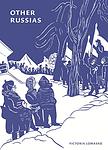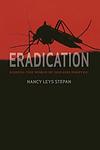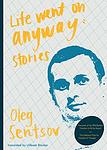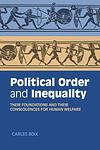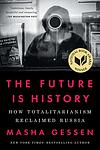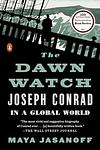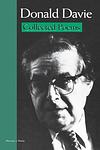The Greatest Russian, Unknown "Nonfiction" Books Since 2010
Click to learn how this list is calculated.
This list represents a comprehensive and trusted collection of the greatest books. Developed through a specialized algorithm, it brings together 284 'best of' book lists to form a definitive guide to the world's most acclaimed books. For those interested in how these books are chosen, additional details can be found on the rankings page.
Genres
Countries
Date Range
Reading Statistics
Click the button below to see how many of these books you've read!
Download
If you're interested in downloading this list as a CSV file for use in a spreadsheet application, you can easily do so by clicking the button below. Please note that to ensure a manageable file size and faster download, the CSV will include details for only the first 500 books.
Download-
1. The Diary Of A Gulag Prison Guard 1935 6 by Ivan Chistyakov
"The Diary Of A Gulag Prison Guard 1935-6" is a chilling and harrowing memoir that provides a firsthand account of the atrocities and cruelty witnessed by Ivan Chistyakov during his time as a guard in a Soviet Gulag prison. Through his detailed entries, Chistyakov reveals the dehumanizing conditions, brutal punishments, and constant fear that both prisoners and guards endured within the oppressive Soviet regime. This haunting narrative serves as a stark reminder of the dark realities of the Gulag system and the lasting impact it had on the lives of countless individuals.
-
2. Other Russias by Victoria Lomasko
"Other Russias" is a powerful and thought-provoking graphic novel that offers an intimate and unfiltered glimpse into the lives of marginalized individuals and communities in contemporary Russia. Through her stunning illustrations and poignant interviews, Victoria Lomasko sheds light on the struggles, hopes, and resilience of diverse groups such as LGBTQ+ activists, migrant workers, political dissidents, and the forgotten voices of rural communities. This eye-opening book challenges stereotypes and provides a humanizing portrayal of those who are often overlooked or silenced in Russian society.
-
3. An Immense World by Ed Yong
"An Immense World" is a collection of science essays written by Ed Yong, a science journalist. The book explores a wide range of scientific topics, from the behavior of animals to the complexities of the human microbiome. Yong's writing is accessible and engaging, making complex scientific concepts easy to understand for readers of all backgrounds. The essays are thought-provoking and provide a glimpse into the fascinating world of science. Overall, "An Immense World" is a must-read for anyone interested in science and the natural world.
-
4. Eradication by Nancy Leys Stepan
This book provides a comprehensive examination of the concept and practice of disease eradication from a historical perspective. It delves into the scientific, ethical, and political dimensions of the global efforts to eliminate diseases, focusing on case studies such as smallpox, malaria, and polio. The narrative critically assesses the successes and failures of these campaigns, highlighting the complexities and challenges involved in attempting to wipe out diseases. Through a detailed analysis, the book explores the implications of eradication efforts on public health policies and practices, questioning the feasibility and desirability of pursuing eradication as a goal in the face of evolving disease dynamics and global health landscapes.
-
5. Life Went On Anyway by Oleg Sentsov
"Life Went On Anyway" is a powerful memoir that chronicles the life of Oleg Sentsov, a Ukrainian filmmaker who was wrongfully imprisoned by the Russian government. Through his vivid and poignant storytelling, Sentsov shares the harrowing details of his arrest, imprisonment, and the relentless fight for justice. Despite the unimaginable hardships he endures, Sentsov's resilient spirit shines through as he reflects on the power of art, the importance of freedom, and the indomitable human will to survive.
-
6. Sustainable Materials by Julian M. Allwood
This book provides a comprehensive exploration into the world of sustainable materials, focusing on the environmental impact of material production and usage. It delves into the science and engineering behind creating materials that are not only durable and functional but also minimize harm to the environment. Through a detailed analysis of various materials, the book offers insights into how industries can shift towards more sustainable practices. It emphasizes the importance of reducing material consumption, recycling, and reusing resources as key strategies for achieving sustainability. The book serves as a crucial resource for engineers, designers, policymakers, and anyone interested in the sustainable development of materials and its significance for the future of the planet.
-
7. Political Order And Inequality by Carles Boix
This book delves into the intricate relationship between political dynamics and social inequalities, offering a comprehensive analysis of how political institutions shape economic disparities and vice versa. The author argues that the formation of political order and the distribution of resources within a society are deeply interconnected processes, influenced by historical events, economic pressures, and power struggles. Through a detailed examination of various political systems and historical contexts, the book presents a theoretical framework for understanding the mechanisms through which political stability and inequality are mutually reinforced, suggesting that the path to a more equitable society lies in the careful restructuring of political institutions to address the root causes of inequality.
-
8. The Bet by Paul Sabin
This book delves into the high-stakes wager between two influential figures, an economist and a biologist, who held opposing views on the future of global resources and population growth. Set against the backdrop of the latter half of the 20th century, the narrative explores the broader debate on environmental policy, economic growth, and the limits of Earth's resources. Through the lens of this famous bet, the author examines the impact of their clash on public discourse and policy, highlighting the complexities of predicting the planet's environmental future. It serves as a fascinating case study on how scientific debates can influence political and public opinion, and the challenges of balancing resource sustainability with human progress.
-
9. The Great Escape by Angus Deaton
This book delves into the historical journey of human progress, particularly focusing on how health and prosperity have evolved over time to create significant disparities in wealth and well-being across different populations. It examines the mechanisms of growth and the spread of prosperity, alongside the challenges and inequalities that have emerged. Through a detailed analysis, the narrative explores the roles of technology, innovation, and government policies in shaping the economic landscapes and the distribution of resources. The author critically addresses the complexities of escaping poverty and the ethical considerations surrounding aid and intervention in less developed economies. The work is a comprehensive exploration of the global patterns of health, wealth, and inequality, offering insights into the potential paths toward a more equitable world.
-
10. When We Cease To Understand The World by Adrian Nathan West, Benjamin Labatut
"When We Cease To Understand The World" is a collection of two novellas that explore the limits of human knowledge and the consequences of scientific discovery. In "The Immaculate Void," a mathematician becomes obsessed with solving a seemingly unsolvable equation and risks his sanity in the process. In "The Unfinished," a group of scientists race to unlock the secrets of nuclear fission, only to realize the devastating power they have unleashed. Through these stories, the authors question the role of science in society and the dangers of pursuing knowledge without considering its ethical implications.
-
11. Exoplanets And Alien Solar Systems by Tahir Yaqoob
"Exoplanets and Alien Solar Systems" provides a comprehensive overview of the field of exoplanet research, exploring the methods used to discover and study planets beyond our solar system. The book delves into the various types of exoplanets discovered, the characteristics of these distant worlds, and the implications for understanding our place in the universe. It also discusses the technological advancements and scientific principles underlying exoplanet detection and analysis, offering insights into future prospects and challenges in the field. This work serves as both an informative guide for those new to astronomy and a detailed resource for seasoned researchers interested in extraterrestrial planetary systems.
-
12. Trans by Juliet Jacques
"Trans" is a candid and poignant memoir that chronicles the personal journey of transitioning from male to female, exploring the complexities of gender identity and the challenges faced by transgender individuals. The author offers an intimate look into their experiences with gender dysphoria, the medical processes of transitioning, and the social implications of living as their true self. The narrative also delves into the broader cultural and political issues surrounding trans rights and representation, providing a nuanced perspective on the intersection of personal and political in the quest for authenticity and acceptance in society.
-
13. The Age of Surveillance Capitalism by Shoshana Zuboff
The book explores the emergence of surveillance capitalism, a new form of capitalism that thrives on personal data. The author details how tech companies, such as Google and Facebook, collect and use personal data to predict and modify human behavior as a means to produce revenue and market control. The book delves into the consequences of this phenomenon on economy, society, and democracy, warning about the dangers of unchecked data collection and manipulation.
-
14. How To Avoid A Climate Disaster by Bill Gates Sr.
In "How to Avoid a Climate Disaster," the author presents a comprehensive and accessible exploration of the challenges and potential solutions to mitigate climate change. Drawing on his extensive experience in technology and philanthropy, he outlines the current state of global emissions and their impacts on the planet. The book emphasizes the importance of innovative technologies and government policies in transitioning to cleaner energy sources. It offers a pragmatic approach to reducing greenhouse gas emissions to zero by advocating for a combination of renewable energy adoption, carbon capture techniques, and advancements in agriculture and manufacturing. The author's insights aim to mobilize individuals, businesses, and policymakers towards urgent action to avert the catastrophic effects of climate change.
-
15. This Much Is True by Miriam Margolyes
In "This Much Is True," the author presents a candid and humorous autobiography that delves into her life as a celebrated actress and storyteller. With a career spanning decades in theater, film, and television, she shares personal anecdotes and reflections on her professional journey, her identity, and her experiences with fame and the arts. Known for her wit and no-nonsense attitude, the author offers readers an intimate look at the highs and lows of her life, her outspoken views on various issues, and the colorful encounters she's had with notable personalities throughout her vibrant career.
-
16. The Future Is History: How Totalitarianism Reclaimed Russia by Masha Gessen
This book provides a deeply researched examination of the resurgence of totalitarianism in Russia, focusing on the lives of four individuals born at what promised to be the dawn of democracy. The book explores how, after the fall of the Soviet Union, instead of moving towards a democratic society, Russia has seen a rise in a new form of totalitarianism under its current leadership. It delves into the psychological shift in the Russian populace, the government's use of homophobia as a method of control, and how the internet and social media have been weaponized for political purposes.
-
17. The Dawn Watch by Maya Jasanoff
"The Dawn Watch" explores the life and times of Joseph Conrad, delving into the profound impact of his experiences as a sailor and immigrant on his celebrated literary works. The book weaves together a biography of Conrad with an analysis of the globalization processes that shaped the modern world, as reflected in his novels. By examining themes such as imperialism, capitalism, and cultural encounters, the narrative not only sheds light on Conrad's personal struggles and insights but also on how his writings foresaw and articulated the complexities and challenges of today's global society.
-
18. The House Of The Dead by Daniel Beer
"The House of the Dead" explores the brutal reality of life in Siberian penal colonies during the nineteenth century, where the Russian Empire sent thousands of prisoners to endure incredibly harsh conditions. The book provides a detailed historical account, drawing on a wealth of archival material and personal stories to illuminate the lives of these exiles. It examines the impact of exile on the transformation of Russia, revealing how the penal system influenced both the society and the political landscape, including the rise of revolutionary movements. Through its vivid narrative, the book paints a comprehensive picture of suffering, survival, and the human capacity to adapt in one of the most inhospitable places on earth.
-
19. A (Very) Short History Of Life On Earth: 4.6 Billion Years In 12 Pithy Chapters by Henry Gee
"A (Very) Short History Of Life On Earth: 4.6 Billion Years In 12 Pithy Chapters" is a concise exploration of the vast expanse of time that has shaped life on our planet. From the origins of life to the evolution of complex organisms, the book takes readers on a captivating journey through the key milestones and transformations that have occurred over the course of 4.6 billion years. With wit and clarity, the author presents a fascinating overview of Earth's biological history, offering a deeper understanding of our place in the grand tapestry of life.
-
20. Poems Of Donald Davie by David Donald
The collection presents a curated selection of lyrical works by a renowned poet, known for his technical mastery and intellectual depth. The poems reflect a wide range of themes, from personal reflections to cultural critiques, all delivered with a precise use of language and a commitment to formal structure. The poet's engagement with history, morality, and the nuances of human experience is evident throughout the anthology, offering readers a profound exploration of the complexities of the modern world through the lens of poetry.
Reading Statistics
Click the button below to see how many of these books you've read!
Download
If you're interested in downloading this list as a CSV file for use in a spreadsheet application, you can easily do so by clicking the button below. Please note that to ensure a manageable file size and faster download, the CSV will include details for only the first 500 books.
Download
